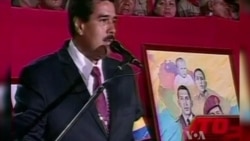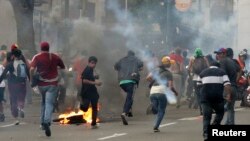The apparent narrow election victory by Venezuela’s interim President, Nicolas Maduro, came as a surprise which some analysts say could reflect the difficulties he will face inheriting the leadership mantle of Hugo Chavez, who died last month. Maduro was expected to win by a comfortable margin, but now faces opposition demands for a recount.
Maduro’s narrow victory, rejected by opposition presidential candidate Henrique Capriles, was greeted by many Venezuelans with surprise.
“The gap was very small. Actually, I was expecting it to be bigger but well, the people expressed their will and it was the popular will, so it’s necessary to respect the results,” he said.
Maduro was expected to win by a comfortable margin. As the handpicked successor to Hugo Chavez, he pledged to continue the legacy of the late Venezuelan leader who brought socialism to the country during his 14-year rule.
Maduro's narrow win, however, may be an indication of his shortcomings, according to Caracas pollster Luis Vicente Leon.
"The candidate wasn't Chavez. I mean he didn't have his charisma, his strength, his connection," Leon noted. "And capacity to engage."
While Maduro has promised to carry out the government’s social welfare policies that have lifted many Venezuelans out of poverty, he also will have to deal with problems, including food shortages, double-digit inflation and rampant crime.
Splits within his coalition will be another challenge, said Latin America expert Johanna Mendelson Forman of the Center for Strategic and International Studies.
“What will determine his space to govern is how Maduro manages the factions in his own party and also in some of the military organizations that in fact came together for the purposes of solidarity in the Bolivarian movement, but may very well come apart," Mendelson explained. "And that is his biggest challenge, not so much in dealing with the opposition, but dealing with the rifts in his party.”
Venezuela's close allies - like Cuba, which receives subsidized oil from Venezuela, welcomed Maduro’s victory. As did Bolivian President Evo Morales, another close supporter.
“Democracy won in Venezuela and this shows that there is a democratic calling not only in Venezuela, but in all of Latin America,” he said.
For their part, Capriles’ supporters have vowed not to accept the results - and Capriles has called for a recount….a demand backed by Washington
“The results revealed a Venezuelan electorate that is roughly evenly divided. In order to meet all of Venezuelans’ democratic expectations, it makes sense that such a recount should be completed before any additional steps, including official certification of the results, occurs,” said State Department spokesman Patrick Ventrell.
Venezuela's electoral board dismissed these comments as interference....another indication that relations with Washington are unlikely to improve soon.
"The election now, which consolidates obviously something we all expected, gives an opportunity to once again renew our relationship," stated Mendelson. "But it seems that the way the Venezuelan government is trying to go about this is certainly not in a particularly positive way.”
For now, however, Maduro's main concern is domestic in the wake of this divisive election.
Maduro’s narrow victory, rejected by opposition presidential candidate Henrique Capriles, was greeted by many Venezuelans with surprise.
“The gap was very small. Actually, I was expecting it to be bigger but well, the people expressed their will and it was the popular will, so it’s necessary to respect the results,” he said.
Maduro was expected to win by a comfortable margin. As the handpicked successor to Hugo Chavez, he pledged to continue the legacy of the late Venezuelan leader who brought socialism to the country during his 14-year rule.
Maduro's narrow win, however, may be an indication of his shortcomings, according to Caracas pollster Luis Vicente Leon.
"The candidate wasn't Chavez. I mean he didn't have his charisma, his strength, his connection," Leon noted. "And capacity to engage."
While Maduro has promised to carry out the government’s social welfare policies that have lifted many Venezuelans out of poverty, he also will have to deal with problems, including food shortages, double-digit inflation and rampant crime.
Splits within his coalition will be another challenge, said Latin America expert Johanna Mendelson Forman of the Center for Strategic and International Studies.
“What will determine his space to govern is how Maduro manages the factions in his own party and also in some of the military organizations that in fact came together for the purposes of solidarity in the Bolivarian movement, but may very well come apart," Mendelson explained. "And that is his biggest challenge, not so much in dealing with the opposition, but dealing with the rifts in his party.”
Venezuela's close allies - like Cuba, which receives subsidized oil from Venezuela, welcomed Maduro’s victory. As did Bolivian President Evo Morales, another close supporter.
“Democracy won in Venezuela and this shows that there is a democratic calling not only in Venezuela, but in all of Latin America,” he said.
For their part, Capriles’ supporters have vowed not to accept the results - and Capriles has called for a recount….a demand backed by Washington
“The results revealed a Venezuelan electorate that is roughly evenly divided. In order to meet all of Venezuelans’ democratic expectations, it makes sense that such a recount should be completed before any additional steps, including official certification of the results, occurs,” said State Department spokesman Patrick Ventrell.
Venezuela's electoral board dismissed these comments as interference....another indication that relations with Washington are unlikely to improve soon.
"The election now, which consolidates obviously something we all expected, gives an opportunity to once again renew our relationship," stated Mendelson. "But it seems that the way the Venezuelan government is trying to go about this is certainly not in a particularly positive way.”
For now, however, Maduro's main concern is domestic in the wake of this divisive election.






